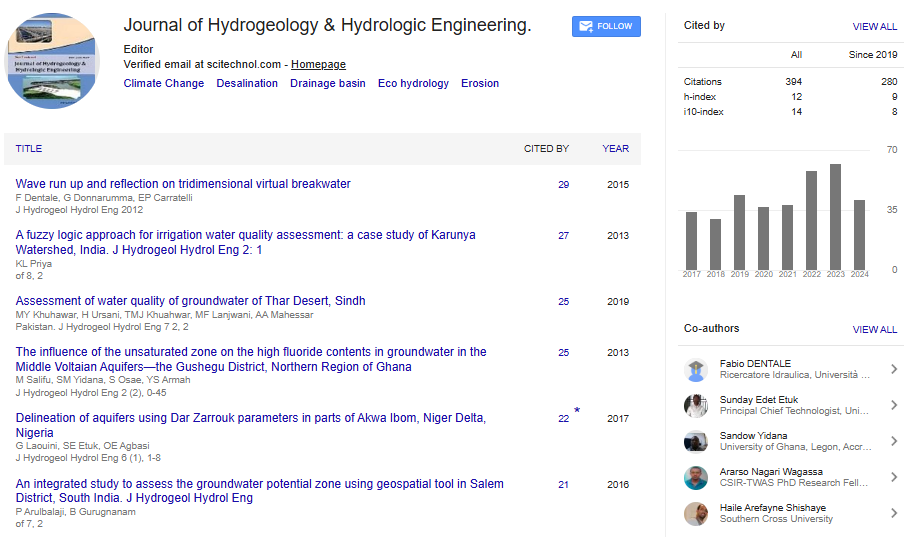Perspective, J Hydrogeol Hydrol Eng Vol: 12 Issue: 2
The Importance of River Water for Environment and Society
Lei Tong*
Department of Environmental Science, China University of Geosciences, Wuhan, China
*Corresponding Author: Lei Tong
Department of Environmental Science, China University of Geosciences, Wuhan, China
E-mail: tonglei58@gmail.com
Received date: 28 March, 2023, Manuscript No. JHHE-23-95823;
Editor assigned date: 30 March, 2023, PreQC No. JHHE-23-95823 (PQ);
Reviewed date: 13 April, 2023, QC No. JHHE-23-95823;
Revised date: 20 April, 2023, Manuscript No. JHHE-23-95823 (R);
Published date: 27 April, 2023, DOI: 10.4172/2325-9647.1000257
Citation: Tong L (2023) The Importance of River Water for Environment and Society. J Hydrogeol Hydrol Eng 12:2.
Description
Rivers are essential sources of fresh water that provide numerous benefits to environment and society. They play an essential role in sustaining life and supporting ecosystems, as well as serving as sources of irrigation, hydropower, and transportation. However, the health and well-being of rivers are under threat due to pollution, climate change, and human activities. In this article, we will explore the significance of river water and the challenges faced by rivers today.
The importance of river water
Rivers are vital sources of freshwater that support the survival of millions of species, including humans. They play an essential role in regulating the water cycle, which involves the movement of water between the atmosphere, land, and oceans. Rivers collect rainwater and surface runoff, which are then transported to other parts of the world, replenishing groundwater reserves and sustaining wetlands, lakes, and other aquatic habitats. Moreover, rivers support the growth of vegetation and provide nutrients to terrestrial ecosystems, which in turn provide habitats for a variety of species.
Apart from their ecological significance, rivers have immense economic and social importance. They are vital sources of irrigation water for agriculture and supply water to millions of people worldwide. Rivers also provide hydropower, which is a clean and renewable source of energy that can be used to generate electricity. In addition, they serve as transportation routes for goods and people, facilitating trade and commerce.
Societal importance of river water
Water Supply: Rivers are a primary source of freshwater for human consumption, agriculture, and industries. They serve as a source of drinking water for millions of people, particularly those living near river basins. Reliable access to clean river water is essential for the well-being, sanitation, and health of communities.
Irrigation and agriculture: River water is extensively used for irrigation in agriculture, supporting crop growth and food production. Through irrigation systems, farmers can cultivate larger areas, improve crop yields, and sustain livelihoods. This plays a crucial role in food security and the economy of many regions.
Energy generation: Rivers offer immense potential for hydropower generation. By harnessing the kinetic energy of flowing water, hydroelectric power plants produce clean and renewable energy. Hydropower not only contributes to national energy grids but also helps reduce greenhouse gas emissions and combat climate change.
Challenges facing rivers
Despite their significance, rivers face numerous challenges that threaten their health and well-being. One of the biggest threats is pollution, which can come from various sources, including agricultural runoff, sewage, and industrial discharges. Polluted rivers not only harm aquatic life but also pose a risk to human health, as contaminated water can cause diseases such as cholera, typhoid, and hepatitis.
Despite their significance, rivers face numerous challenges that threaten their health and well-being. One of the biggest threats is pollution, which can come from various sources, including agricultural runoff, sewage, and industrial discharges. Polluted rivers not only harm aquatic life but also pose a risk to human health, as contaminated water can cause diseases such as cholera, typhoid, and hepatitis.
Human activities such as damming, dredging, and urbanization also pose a threat to rivers. Damming can alter river flow, affecting aquatic habitats and fish populations. Dredging can disrupt river ecosystems, and urbanization can increase pollution, reduce water quality, and cause habitat destruction.
Conclusion
Rivers are an essential resource that sustains life and supports ecosystems, as well as serving as sources of energy, transportation, and irrigation. However, they face numerous challenges that threaten their health and well-being, including pollution, climate change, and human activities. Protecting rivers requires a collaborative effort that involves governments, communities, and individuals. Efforts to reduce pollution, mitigate climate change, and promote sustainable practices can help to ensure that rivers continue to provide vital services to environment and society.
 Spanish
Spanish  Chinese
Chinese  Russian
Russian  German
German  French
French  Japanese
Japanese  Portuguese
Portuguese  Hindi
Hindi 
